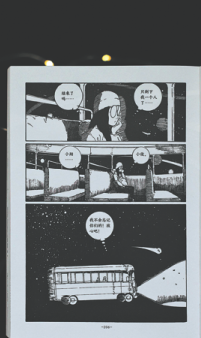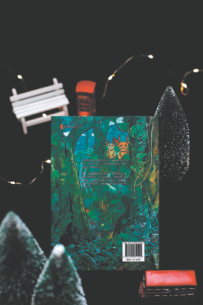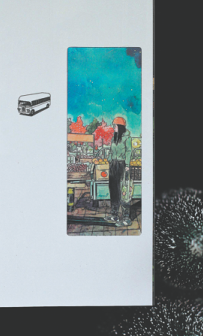TENDER TRIBUTE
Realist illustrator releases fantastical comic book inspired by his grandmother, Wang Qian reports.

For comic artist Zou Jian (pen name Zuo Ma), most of his childhood memory is from his grandmother's house in a village in Hubei province. But as his grandmother, Wu Ya'nan, had Alzheimer's, she couldn't remember much of the good times and finally lost her battle in 2017.
The comic book Night Bus is Zou's tender tribute to her, in which a young woman in round glasses takes a bus ride at night as routes constantly change through fantastical landscapes in the countryside.
"Inspired by my own life, the comic book focuses on my relationship with my grandmother," says the 38-year-old artist.
He writes in the postscript: "Everything in this story is from the past-things that are gone now. Some things were once ordinary and insignificant, like my grandparents' home in the countryside. My whole life, I never thought there was much to say about that place. Only when it became impossible to return there, did my memories of it become precious."
Translated into English, the book was released by Canadian publishing company Drawn and Quarterly in August. The book blends autobiography, horror and fantasy into a vibrantly detailed surreal world. It has also been published in Italy, France, the United States and Indonesia, Zou says.
According to The New Yorker's review, Night Bus explores "memories of a vanishing China" and highlights the changes brought about by industrialization.
The US magazine comments: His surreal style of narration and graphic style are reminiscent of Japanese masters Yoshihiro Tatsumi and Yoshiharu Tsuge, while his love for detail and fascination with insects is reminiscent of Studio Ghibli's work.
The magazine also says the book offers a glimpse into China's alternative comics scene.
Drawn and Quarterly describes Zou as "part of a burgeoning Chinese art comics scene that pushes emotion to the forefront of the story while playing with action and dreams".
Booklist, a publication of the American Library Association, which does book reviews, sees Zou as "a leader in China's alternative comics scene" who thoughtfully annotates each story with provenance and original publication, layering context and personal experience into his graphic memories.
Manga influence
Influenced by his father who is an ink artist, Zou developed a fascination for drawing at a young age. While in grade two or three in Zhijiang, Hubei, he started to go through manga comics such as Dragon Ball and Saint Seiya.
"I began to draw characters from Dragon Ball, hoping that one day I would become a manga artist like Akira Toriyama (creator of the manga)," Zou recalls.
Since Astro Boy became the first Japanese animation series to be introduced in China around 1980, more manga works have arrived, causing the art form to quickly spread among teen groups in the country. Meanwhile, comic magazines began to appear on the Chinese market. In 1993, Comic's King went on sale. It is said to be China's first comic magazine, mainly introducing Japanese manga while promoting domestic illustrators.
In junior middle school, many of Zou's classmates were fascinated by Japanese anime series. He kept drawing comics and hoped that one day his work would be published, he says.
During his senior middle school days in Hubei, his dream came true when his work was published by Comicfans, a Guangzhou-based magazine in Guangdong province. Although it was about the size of a stamp, Zou still recalls how excited he was then.
Before entering college, Zou spent most of his spare time drawing comics. When he was about to take the national college entrance exam in 2001, he set Beijing as his destination, because it was where most comic magazines and cartoonists came from, he says.
As he wished, he entered the Beijing Institute of Fashion Technology to study graphic design. During his college days, the popularity of the internet had opened "a new world of comics" to Zou, where he could communicate with comic fans from all over the country instantly. Online, he first encountered comics from Europe, which furthered his understanding of the art form.
Zou read comics in Japanese and Western styles but also wanted to find his own style. During his fourth year in college, he found a job at a local animation company and the one-year experience there helped him gain some self-confidence. He quit the job shortly after graduation in 2005 and began his career as an independent cartoonist and illustrator.
His first work, Guanzhuang Yezi ("canned coconut"), was published in France in 2007. The 40-page colorful comic book tells about the uncertainty, anxiety and confusion a young man faces moving from college to the real world.
"I am lucky to have had my first book published at the age of 24," Zou says.
But creating comics, especially in the long format, didn't get him to make ends meet in Beijing. In 2008, Zou returned to his hometown, Zhijiang.
Long form
Living with his parents for more than a year, he liked to observe life nearby, from the expressions on people's faces while talking about the dramatic changes in the countryside brought about by urbanization.
"The connection to a place where you are born and grow up is unique, which can inspire your creativity," Zou says.
In Zhijiang, his friend, Peng Han, who is also an illustrator, lent him comic books by Japanese writer Tsuge that surprised him at first sight.
"Tsuge's comics are close to life, where there are muddy country roads, ordinary or even ugly characters and mottled walls. In his comic world, everything looks familiar and peaceful," Zou says.
Looking around the area where he spent his childhood, Zou got inspired. In 2013, his comic book Walk was published. It includes 10 short stories he created from 2008 to 2013, connected to his own experiences and reflection.
In one of the stories, titled Cat Boy, an unappreciated artist sees himself as a stray cat in danger of being drowned; another piece, A Story of Fireworks, revolves around a Spring Festival tradition that is later banned to reduce air pollution; and in another, Walk Alone, an old woman refuses to leave her countryside house and live with her grandson in the city, while the grandson thinks "the village is no longer the same as it is in his memory", where only the elderly and children live and bulldozers have flattened the hills.
Zou inks his drawings on paper, focusing on long-form narratives.
"My work concerns reality, because there are so many things and issues worth drawing and recording in China," he says.






Today's Top News
- Manufacturing in China spurs global growth
- Taiwan lawmakers vote to pass motion to impeach Lai
- Xi: Steadfastly implement conduct rules
- High-speed rail reaches 50,000 km milestone
- China puts sanctions on US defense firms, execs
- Iconic hall reopens after decade-long renovation






























